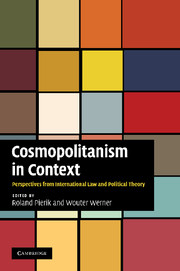Book contents
- Frontmatter
- Contents
- 1 Cosmopolitanism in context: an introduction
- Part I Environmental protection
- Part II World Trade Organization
- 4 The WTO/GATS Mode 4, international labor migration regimes and global justice
- 5 Incentives for pharmaceutical research: must they exclude the poor from advanced medicines?
- Part III Collective security and intervention
- Part IV International Criminal Court
- Part V International migration
- Part VI Conclusion
- Index
- References
5 - Incentives for pharmaceutical research: must they exclude the poor from advanced medicines?
Published online by Cambridge University Press: 06 December 2010
- Frontmatter
- Contents
- 1 Cosmopolitanism in context: an introduction
- Part I Environmental protection
- Part II World Trade Organization
- 4 The WTO/GATS Mode 4, international labor migration regimes and global justice
- 5 Incentives for pharmaceutical research: must they exclude the poor from advanced medicines?
- Part III Collective security and intervention
- Part IV International Criminal Court
- Part V International migration
- Part VI Conclusion
- Index
- References
Summary
Introduction
During the last 15 years, the United States and other affluent countries have worked hard and successfully to incorporate substantial and uniform protections of intellectual property rights (IPRs) into the fabric of the global trading system. This initiative included the Trade-Related Aspects of Intellectual Property Rights (TRIPS) Agreement formulated in the so-called Uruguay Round that led up to the formation of the World Trade Organization (WTO). It was continued through a series of bilateral free-trade agreements including additional (“TRIPS-plus”) provisions that enable patent holders to extend (or “evergreen”) their market exclusivity beyond the twenty years enshrined in the TRIPS Agreement and also discourage, impede, and delay the manufacture of generic medicines in many other ways, e.g. through provisions on data exclusivity and through restrictions on the effective use of compulsory licences.
Intellectual Property Rights (IPRs) can help ensure that creative productions are protected from unauthorized modification and that their authors receive royalties or licensing income from the reproduction of their work. Much more consequential than such copyrights, however, are patents, which prohibit the unauthorized reproduction of a vast range of products and productive processes. Such patent protections are more problematic, morally, than copyrights, especially when they confer property rights in biological organisms (such as seeds used in food production), in molecules that make medicines effective, or in pharmaceutical research tools needed to develop new pharmaceuticals. The present essay analyses the severe moral problems the current regime engenders in the domain of pharmaceuticals.
- Type
- Chapter
- Information
- Cosmopolitanism in ContextPerspectives from International Law and Political Theory, pp. 106 - 126Publisher: Cambridge University PressPrint publication year: 2010



